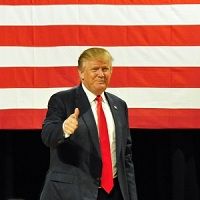Article
Are Hillary Clinton and Donald Trump Healthy Enough to be President?
Author(s):
Will our next president be medically fit? And how much is the public entitled to know about candidates’ personal health?
Note: Cindy C. Ginsberg, MD, PhD, is the co-author of this article.

Questions continue to arise regarding the health of Democratic presidential nominee Hillary Clinton and Republican presidential nominee Donald Trump, most recently with Clinton’s doctor’s Sept. 11 confirmation that the candidate has pneumonia. She also was treated for a blood clot in her head in 2012, apparently due to a concussion she suffered in plane crash in Iran.
On September 14, the Clinton campaign released a letter from Clinton’s physician that provided information about the candidate’s medical history and medications, and said she was “healthy and fit to serve as the president of the United States.”
Until recently, Trump’s health was officially assessed only in what amounts to a doctor’s note in which his physician Harold Bornstein says Trump would be “the healthiest individual ever elected to the presidency.” On September 15, the Trump campaign released a new, more detailed note from Trump’s doctor that provided information from several tests and declared the candidate to be in “excellent physical health.”
In my opinion, the public is entitled to detailed, unbiased information from outside the candidates’ campaigns.
The candidates’ health has been an issue of special interest this year because, at the respective ages of 68 (Clinton) and 70 (Trump), both candidates are substantially older than the 50-something average for US presidential nominees.
In my medical opinion, United States presidential candidates, as well as candidates for other high-ranking elected government offices, should be required to undergo an independent medical clearance exam. This exam would accomplish three things: (1) it would provide the public with information crucial to their ability to evaluate candidates’ fitness, (2) it would allow for the establishment of a presidential medical clearance process, and (3) it would end speculation about candidates’ health during campaigns, which may distract from more important political issues.
Presidential candidates customarily release at least a portion of their medical records to demonstrate their fitness for office, but this disclosure is entirely voluntary, and an independent medical exam is not required.

Over the past 50 years, there have been at least two cases where sitting presidents suffered from chronic medical conditions that should have been disclosed to voters. Dwight Eisenhower had cardiovascular disease leading to both a heart attack and a stroke while he was in office, and John F. Kennedy suffered from Addison's disease, as well as having chronic back pain for which he variously took codeine, Demerol, and methadone. Kennedy's use of opioids and other drugs had the potential to affect his judgment.
In my clinical practice, I am called upon daily to clear patients for procedures ranging from relatively benign interventions like cataract surgery to high-risk procedures such as orthopedic, heart, and brain surgery. In the process, I make sure medications are optimized, needed pre-testing has been sufficiently passed, and the patient is operationally fit.
If not, then no go. Also, we physicians are often asked to clear seemingly healthy patients who have suffered sports injuries for return to play. Clearance, in this sense, is about risk assessment. Surgeons want to know their patients’ risk of dying during surgery, and coaches want to know players’ risk of re-injury/worsening injury if they resume play. In the same vein, political parties and the American public should have credible data with which to assess candidates’ risk of serious illness/death during office. Without breaking patient privacy rules in HIPAA, the public deserves to know at least basic medical details.
“Clearance” is not a vague idea of someone's fitness, but a well-defined process involving exam components that are specific to the activity for which the patient is being cleared — whether that activity is surgery, sports, or employment. When a patient suffers a heart attack, stroke, or other medical condition that interrupts their work duties, most employers require that they obtain medical attestation from a physician that they are able to perform their particular job function before they are allowed to return to work. Many industries (ie, aviation, transportation, and military) have their own specialized exams addressing particular components of "fitness" for job performance in that particular industry. Would you feel comfortable getting on a plane flown by a pilot who hadn't undergone a comprehensive physical? Why, then, are those who aspire to pilot the country not required to submit to an equally comprehensive assessment? Many federal agencies do routinely conduct pre-employment physicals for substantially more mundane positions.

What, exactly, should a presidential fitness exam entail? Many industries have clearance protocols involving two physicians: one to address general health or specific medical issues, and one to examine work-specific fitness. What clearance for many employees involves is both a general health examination by their personal physician, and a separate exam performed by an occupational physician — contracted by that person's employer. Similarly, sports franchises such as the NFL and NBA have instituted concussion protocols where players must be cleared by both a team physician and an independent neurologist before returning to play. Such two-physician clearance protocols act as a fail-safe, ensuring that assessments are made as objectively as possible.
I would propose a similar process must be adhered to when it comes to medically vetting our political candidates. In my opinion, brief notes from a personal physician do not constitute proof of adequate medical examination for our presidential candidates. I submit that presidential candidates should be required to undergo an official and legitimate medical clearance process involving at least two physicians, one of whom is an independent and objective (and actively practicing) clinician. A presidential medical exam might include review of candidates medical and surgical records, cognitive and psychiatric testing, and evaluation of exercise tolerance along with basic labs and a proper physical exam.
Regardless of who is elected to the presidency this November, I would hope that the public will have enough information about the candidates to make a well-informed decision, and that the individual elected is truly medically and operationally fit for duty.





